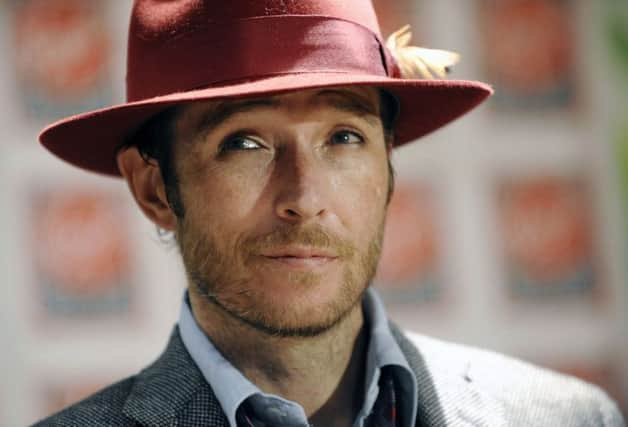Obituary: Scott Weiland, rock star


Scott Weiland was an American rock singer who performed with a number of bands, although it was as a founder member of Stone Temple Pilots that he enjoyed most success. The group earned six American top ten albums between 1992 and their reunion album in 2010, while Weiland also saw success as the singer of rock supergroup Velvet Revolver in the mid-2000s – essentially the core membership of Guns ’N’ Roses with Weiland in place of Axl Rose.
Although they stepped into an American scene still reeling from the impact of Seattle’s grunge sound, and particularly the seismic effect which Nirvana had upon the listening tastes of rock audiences, there was also something indefinably old-school about Stone Temple Pilots. They shared the same tastes in tortured, howling guitar riffs and earnest, downcast lyricism as contemporaries like Pearl jam and Soundgarden, but their sonic focus alighted on an acute pop sensibility, albeit with a meatier edge to it.
Advertisement
Hide AdAdvertisement
Hide AdIt’s rare to say that the appeal of a group can noticeably be laid on one of its members alone, but as much as his bandmates (brothers Dean and Robert DeLeo and drummer Eric Kretz) were more than capable musicians, it was Weiland’s voice which cut through most of their songs like a serrated blade. Gruff and raw, delivered from the throat, his bassy vocals spoke of a wounded masculinity, expressive and rich with a finely-controlled country twang at their heart.
Born Scott Richard Kline in California to Sharon and Kent, he took his stepfather David Weiland’s name when he adopted him at the age of five, the young Scott’s parents having divorced. He was raised in Ohio until he moved back to California to attend high school. A natural singer from an early age whose favourite artists were the Beatles and David Bowie, he sang in school choirs as a soloist.
In Weiland’s early years there are unhappy traces of what forged the man he grew up to be, a gifted rock singer with an unfortunate and haphazard liking for all the unpleasant temptations which accompany such a lifestyle. In his 2011 memoir Not Dead & Not For Sale he said he was sexually assaulted at the age of 12 by an older boy who threatened him into silence; it was a memory which he suppressed until many years later in rehab.
Back in California Weiland lost interested in school, aside from when he began to play with fellow musicians he met there in his first bands. As a young man he discovered recreational drug use, and it was a habit which remained with him on and off for most of his life.
Legend has it, although there are contradictory stories, that Stone Temple Pilots came into being following Weiland and Robert DeLeo’s meeting at a 1986 Californian gig by American punk icons Black Flag. The pair apparently discussed women they were dating, and realised that one of these was the same person – they both moved in with her and became good friends and bandmates. It’s a story which has the ring of invention or anecdotal apocrypha spread by the band, and yet regardless of the truth, it carries a certain sense of the couldn’t-care-less rock ‘n’ roll myth which the group – and particularly Weiland – bore with them.
Weiland and DeLeo formed the group Mighty Joe Young, which found modest success playing around the bars and clubs of San Diego, before being picked up for a major label deal. Advised that the name Mighty Joe Young was already in use by another artist, they switched to Stone Temple Pilots because apparently they liked the acronym – alternatives, rude and otherwise, were passed around before they settled on the name.
Releasing their debut album Core in 1992, the group went on to have an uninterrupted run of success for the next decade, with their following albums – Purple (1994), Tiny Music… Songs from the Vatican Gift Shop (1996), No.4 (1999) and Shangri-La Dee Da (2001) – all required listening for rock fans and high school and college students of the time. Purple was a US number one record and, although they were never a group who enjoyed any breakthrough popular hits, the track Plush won two of the four Grammy awards they racked up.
Stone Temple Pilots’ success tracked the course of Weiland’s drug use. Getting into heroin after becoming famous, he was sent to rehab and finally prison, with the friction between himself and the band seeing him leave in 2002. Over the rest of his life he staged two significant comebacks, first with Velvet Revolver across two hugely successful records between 2003 and 2008, winning another Grammy for the song Slither, and then with Stone Temple Pilots’ eponymous reunion album in 2010, also a hit.
Advertisement
Hide AdAdvertisement
Hide AdYet each time, Weiland’s drug use and unpredictability was believed to have contributed to his departure. He also recorded under his own name, releasing the solo albums 12 Bar Blues (1998), which featured Sheryl Crow, Happy in Galoshes (2008), and A Compilation of Scott Weiland Cover Songs and Christmas record The Most Wonderful Time of the Year (both 2011). His covers record revisited his beloved Bowie and the Beatles, as well as artists like Nirvana and the Stone Roses.
A performer and lyricist of power, sensitivity, extravagance and skill, it’s to be hoped that Scott Weiland’s more debauched episodes will pass from memory to leave the prodigious contribution he made to American music behind. He died, aged 48, while on tour with his current band the Wildabouts, and is survived by his third wife Jamie and two children from his second marriage.